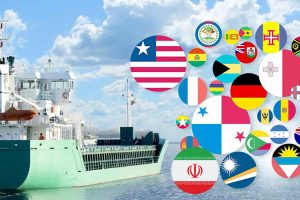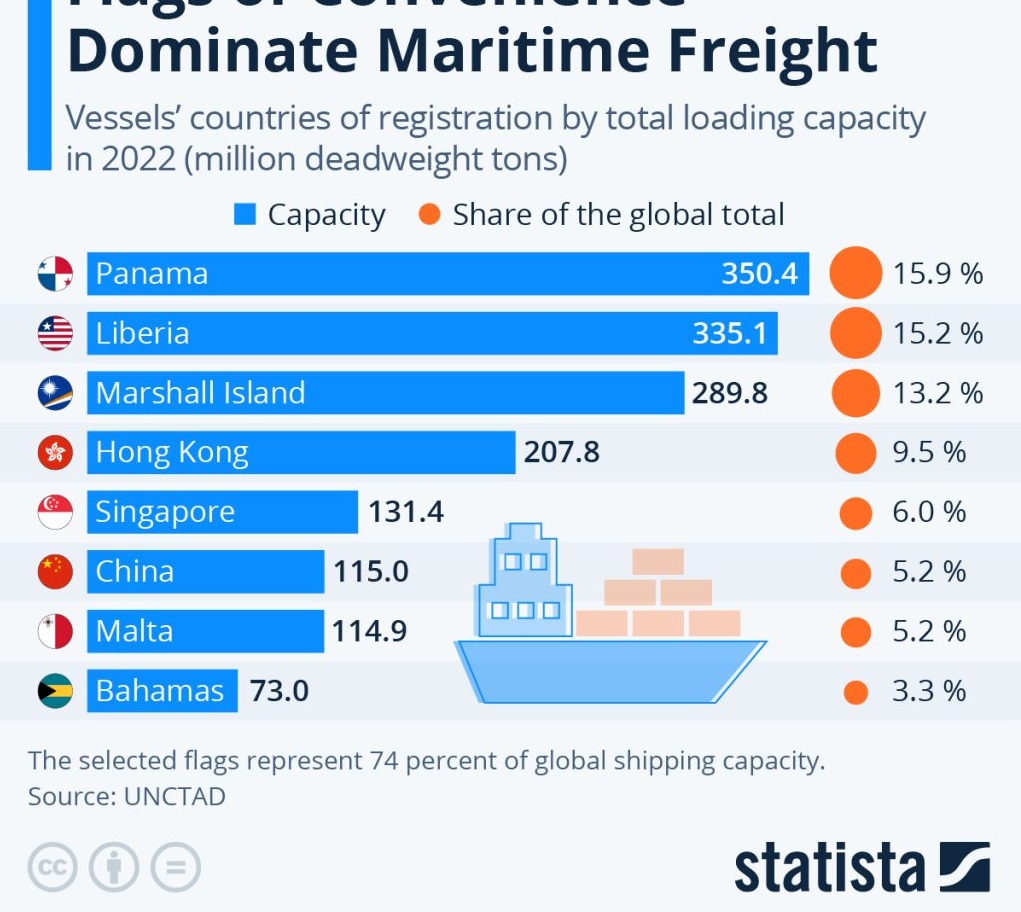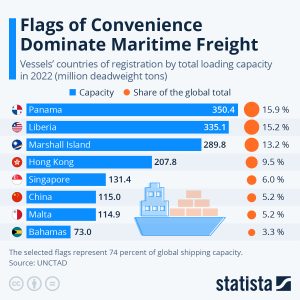The global shipping industry relies on a complex web of regulations, taxes, and safety standards—but many shipowners bypass these by registering vessels under Flags of Convenience (FoC). These offshore registrations allow companies to minimize costs, avoid strict labor laws, and reduce taxes, making them a dominant force in maritime freight.
According to UNCTAD (2022), Panama, Liberia, and the Marshall Islands alone account for 44.3% of global cargo capacity, while traditional maritime powers like China (5.2%) and the USA (0.4%) lag far behind.
Image Credit: Statista
Imagine a ship built in South Korea, owned by a Greek company, managed from London, crewed by Filipino seafarers, and registered in Panama. At first glance, this mix might seem confusing—but it is the norm in modern shipping. The reason lies in a practice called the Flag of Convenience (FoC).
A Flag of Convenience refers to the registration of a merchant vessel in a country that is different from the shipowner’s base of operations, usually to take advantage of lower taxes, lighter regulations, and faster registration procedures. Unlike traditional registries—such as the United States, United Kingdom, or Japan—where ships are tied to national fleets with strong oversight, FoC registries operate more like business services: open to any shipowner willing to pay the fee.
The Evolution of Flags of Convenience
The practice dates back to the early 20th century, but it gained prominence after World War II, when shipowners sought to reduce operating costs. Panama and Liberia became pioneers of the system, offering shipowners the chance to fly their flags in exchange for low registration fees and minimal oversight.
By the 1980s, as global trade expanded, FoC registries had become the backbone of world shipping. Today, the majority of the world’s merchant fleet sails under FoC nations. For instance, Panama, Liberia, and the Marshall Islands together account for nearly 40% of global shipping tonnage in 2024.
Why Shipowners Choose FoCs
FoC registries attract shipowners for several reasons:
-
Lower taxes: Many FoC states charge little to no corporate income tax, allowing owners to save millions annually.
-
Lax regulations: Safety, environmental, and labor rules are often less stringent, reducing compliance costs.
-
Easier registration: Ship registration in FoC nations can be completed within days, with minimal paperwork and no need for the ship to ever visit the flag state.
-
Flexibility in crewing: FoC registries often permit international crews from countries with lower wage standards, reducing labor expenses.
This combination makes FoCs appealing for companies competing in a highly cost-sensitive industry.
Criticism and Controversy
While economically attractive, Flags of Convenience have sparked heated debate. Critics argue that FoCs:
-
Undermine safety and labor standards: Some FoC states are accused of weak inspections, allowing poorly maintained ships to operate. This can put seafarers at risk and increase the chance of accidents.
-
Enable environmental abuse: Weaker enforcement means ships may cut corners on emissions, ballast water management, or waste disposal.
-
Facilitate opaque ownership: By allowing anonymous or complex ownership structures, FoCs can be misused for tax evasion, money laundering, or even illegal fishing.
-
Weaken accountability: In cases of oil spills or maritime disasters, tracing responsibility back to owners becomes more difficult.
For example, the Prestige oil spill (2002) off the coast of Spain involved a Liberian-flagged tanker. Investigations revealed gaps in oversight, fueling public anger against FoC practices.
The Economic Perspective
Supporters of FoCs argue that they have democratized global shipping. By lowering barriers, they allow smaller shipping companies to compete internationally. Some FoC states also insist that they meet international obligations under the International Maritime Organization (IMO) and provide regular inspections, though the quality varies widely from country to country.
In fact, not all FoC registries are the same. While Panama and Liberia have historically faced criticism, the Marshall Islands registry has gained a reputation for efficiency and compliance, often ranking high on Paris MoU and Tokyo MoU performance lists in recent years.
Flags of Convenience in 2024–2025: Current Trends
By 2025, FoCs continue to dominate the shipping world, but scrutiny is intensifying. Several developments stand out:
-
Sustainability pressures: As the IMO enforces stricter decarbonization targets (such as the 2023 GHG Strategy), FoC states are under pressure to prove they can enforce environmental rules. Some registries are introducing digital compliance systems and green incentives to attract eco-conscious shipowners.
-
Geopolitical risks: The Russia–Ukraine war and tensions in the Middle East have highlighted the role of FoCs in global security. Shadow fleets carrying sanctioned oil often use FoCs, raising concerns about transparency and enforcement.
-
Port State Control (PSC) inspections: Countries receiving FoC vessels are increasing inspections to ensure compliance, reducing the ability of substandard ships to slip through unchecked.
-
Competition among registries: Traditional maritime nations, like Norway and Japan, are trying to modernize their own registries to attract owners back, but FoCs remain cheaper and easier.
–
Why Do Shipowners Use Flags of Convenience?
1. Lower Operating Costs
- Tax avoidance: Companies save millions by registering in tax-free jurisdictions.
- Cheaper labor: FoC ships often hire low-wage crews from developing nations.
- Reduced regulatory costs: Fewer safety inspections and compliance requirements.
2. Avoiding Strict National Laws
- Labor laws: Many FoC nations don’t enforce ILO (International Labour Organization) standards.
- Environmental rules: Weak enforcement of emissions and pollution controls.
- Safety inspections: Less frequent checks increase profit margins but raise accident risks.
3. Anonymity & Liability Protection
- Shell companies hide true ownership, making legal accountability difficult.
- Insurance & liability claims are harder to enforce under FoC registries.
–
Top Flags of Convenience in 2024
According to UNCTAD’s 2022 data, the biggest FoC registries by cargo capacity are:
| Flag Country | % of Global Fleet (DWT*) | Key Features |
|---|---|---|
| Panama | 18.7% | Largest registry, lax oversight |
| Liberia | 13.5% | Popular with tankers & bulk carriers |
| Marshall Islands | 12.1% | Fast-growing, tech-friendly registry |
| Malta | 5.2% | EU-linked but relaxed rules |
| Bahamas | 3.3% | Favored by cruise ships |
DWT = Deadweight Tonnage (total carrying capacity)
Comparison with Traditional Maritime Nations
- China: 5.2% of global fleet (despite being the world’s largest exporter)
- USA: 0.4% (strict regulations make registration unattractive)
- Japan: 1.1% (declining due to high costs)

Controversies & Risks of Flags of Convenience
1. Poor Safety & Environmental Records
- Higher accident rates: FoC ships are overrepresented in major spills and sinkings.
- Weak pollution controls: Many avoid emissions rules (e.g., dumping waste at sea).
- “Ghost ships”: Some FoC vessels operate illegally with fake documents.
2. Exploitation of Seafarers
- Low wages & unsafe conditions: Crews from developing nations face abuse.
- Abandonment cases: Some owners desert crews without pay in foreign ports.
3. Geopolitical & Security Risks
- Sanctions evasion: Iranian/Venezuelan oil often smuggled via FoC ships.
- Piracy & smuggling: Weak oversight enables illegal activities.
–
Future of Flags of Convenience: Will Regulations Tighten?
1. Growing Pressure from the EU & IMO
- EU blacklist: Targets high-risk FoC ships with port bans.
- IMO 2023 reforms: Stricter emissions and safety checks.
2. Alternative Registries Gaining Traction
- Norway’s NIS: Combines tax benefits with better safety standards.
- Singapore: Attracts owners with efficiency (not just low costs).
3. Will Digitalization Increase Transparency?
- Blockchain tracking could expose shell companies.
- AI-powered monitoring may reduce illegal activities.
Conclusion
Flags of Convenience illustrate the tension between economic efficiency and regulatory responsibility in global shipping. For shipowners, FoCs represent cost savings and operational flexibility. For critics, they symbolize regulatory loopholes that compromise safety, labor rights, and environmental protection.
In 2024–2025, the debate is shifting. With decarbonization, digitalization, and geopolitical risks reshaping maritime trade, FoC states are being forced to demonstrate greater accountability. The challenge for the global maritime community is not simply to abolish or defend FoCs, but to ensure that open registries operate responsibly and uphold the same international standards as traditional flag states.
Ultimately, as long as global shipping remains cost-driven, Flags of Convenience will continue to thrive—yet their legitimacy will depend on whether they can balance economic advantage with genuine oversight and responsibility.


